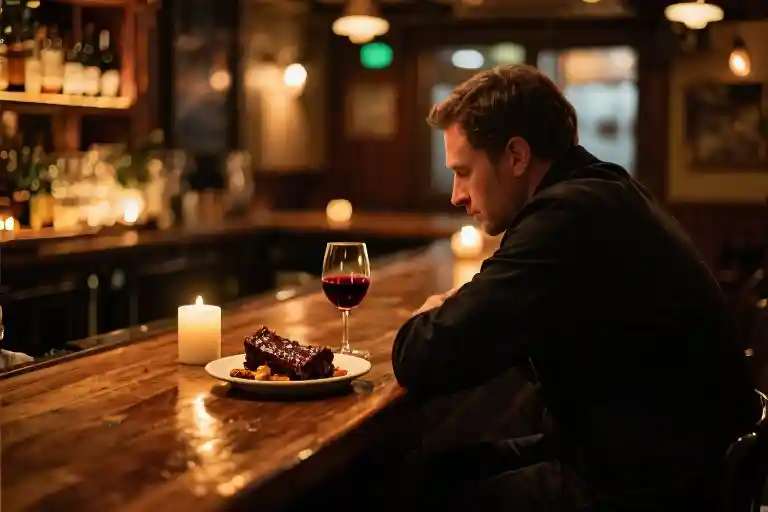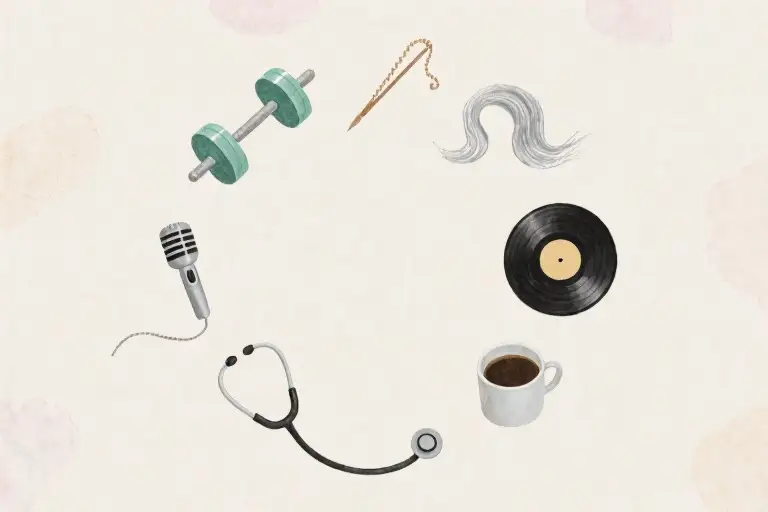The crisp sound of my credit card sliding across the payment terminal echoed in the dimly lit gastropub – $30 for a single plate of braised short ribs and a glass of something dark enough to match my mood. As the first forkful touched my tongue, an unexpected sharpness jolted me. Not the wine’s tannins, but the phantom taste of sumac from a decade ago, acidic and insistent like fingers snapping in front of dazed eyes.
We remember flavors longer than faces. The cumin-dusted hands that once presented plov like a sacrament, the saffron threads clinging to rice grains like tiny surveillance devices – these sensory imprints outlasted the man himself. What lingers isn’t the twenty-nine-year-old who spoke in seminar-room sentences, but the theatrical pause before each ‘close your eyes’ command, the weight of that wooden spoon hovering near my lips like a scepter.
There’s a particular quiet that settles when someone places food before you with deliberate intention. Not the transactional clatter of restaurant service, but the charged silence of ‘this is for you’ – three words that momentarily suspend all questions of worthiness. The dishes themselves became secondary to that suspended moment where being chosen felt like truth rather than performance.
Now the ritual has inverted. My knife glides through slow-cooked meat at a table for one, each deliberate chew measuring the distance between being fed and feeding oneself. The bartender eyes my untouched second glass – not judgmental, just professionally observant in ways that recall another pair of watching eyes. Thirty dollars buys more than dinner; it purchases the right to leave half a drink undrained, to exit midway through the third course without explanation. Freedom tastes like overpriced rosemary salt and the metallic tang of a pen hovering over the receipt’s tip line.
What we’re really consuming at these solitary tables isn’t listed on any menu. Not the heritage pork or artisanal bitters, but the quiet reassurance that we can still taste the past without choking on it. The sumac’s ghost fades with the next sip, leaving only the present moment’s reliable bitterness – cleaner, somehow, without the aftertaste of someone else’s expectations.
The Weight of Wooden Spoons
He always held the spoon like a scepter. That worn wooden utensil became an extension of his authority in the kitchen, its rounded edge leaving invisible marks on more than just the simmering plov. When he’d say “close your eyes” with that particular lilt, it wasn’t an invitation—it was a command performance. I’d feel the warmth of his body hovering near mine, the steam from the pot carrying cumin and something sharper, something that made my tongue recoil even as I leaned in closer.
There’s a particular power in being fed by someone who studies your reactions. He didn’t just want appreciation; he demanded recognition of his culinary genius. Each bite came with an unspoken test—could I name the spices? Would my face show the right sequence of surprise, pleasure, awe? The wooden spoon would tap against the pot’s edge like a professor’s pointer hitting a chalkboard, emphasizing ingredients as if they were moral lessons: “Notice how the saffron threads dissolve into the rice? That’s how attention should be given—completely, without reservation.”
What unsettled me most wasn’t the age gap or his occasional condescension, but how willingly I played my part in these kitchen rituals. Crossing my ankles on the barstool, I’d perform the expected delight at each new dish. The sumac’s citrus bite became indistinguishable from the acidic aftertaste of his smug satisfaction. Years later, I can still taste that particular combination—the earthy warmth of well-spiced food undercut by something metallic and sour.
We pretend cooking is about nourishment, but some kitchens operate as miniature kingdoms. The one who controls the stove controls the narrative—what gets served, how it’s seasoned, when it’s consumed. My protests about too much salt or not enough heat would be met with patient explanations about why I was wrong. Even now, when a dish tastes slightly unbalanced, I hesitate to trust my own palate.
That wooden spoon hangs in my kitchen now, a relic from when he moved out. Sometimes I take it down just to feel its weight in my hand—lighter than I remember, but still bearing the ghostly imprint of fingers that knew exactly how much pressure to apply.
The Taste of Memory
Certain dishes become emotional archives. The Russian plov he made still surfaces in my dreams – each grain of rice carrying the weight of possession. That particular shade of orange from the carrots wasn’t just color; it was a claim. When he’d say eat in that professor-meets-cult-leader tone, the saffron threads clinging to the rice like tiny surveillance devices, I understood this was about more than nourishment.
Science tells us taste memories lodge deeper than other sensory imprints. The olfactory bulb’s direct pathway to the hippocampus explains why cumin can time-travel me back to that kitchen island faster than any photograph. But neuroscience doesn’t account for how sumac’s citrus bite still makes my shoulders tense with remembered scrutiny, or why ropa vieja’s shredded texture feels like overhandled affection.
Childhood foods wore their meanings lightly – my mother’s chicken soup simply meant comfort, not psychological subtext. Adult relationship foods come encrypted. That $30 gastropub burger last week? The first bite unleashed a flood of questions: Was I paying for the grass-fed beef or the illusion of being cared for? Did the truffle aioli cover the metallic taste of my own loneliness?
The real inheritance from those shared meals wasn’t culinary skill, but the permanent rewiring of my palate. Now every spice aisle feels like walking through a gallery of past selves – the smoked paprika of that summer fling, the black pepper of a winter’s discontent. We think we’re tasting food when really we’re consuming our own histories, chewing on time itself.
Some flavors outlast their creators. The man faded but the saffron remained, staining my memories yellow. Perhaps this is why restaurant menus should come with trigger warnings, why cookbooks need emotional ingredient lists. Because when we say pass the salt, what we often mean is I remember who last seasoned my life.
The Solitary Feast
The receipt said $30.75, but what I really paid for was the right to sit alone at this walnut bar without anyone asking if I was waiting for someone. Eight dollars covered the dim lighting that hid my face just enough, fifteen bought the illusion that the bartender’s polite smile meant something personal, and the remaining seven seventy-five purchased the privilege of eating steak tartare at 3pm on a Tuesday like it was perfectly normal behavior.
There’s an unspoken liturgy to dining alone that no one teaches you. You arrange the silverware in precise parallel lines, not because it matters, but because controlling the placement of knives feels like governing some small kingdom. The napkin goes on the lap not for practicality, but as ceremonial garb. Every sip of wine becomes a deliberate act of self-communion rather than mere hydration.
I’ve developed my own Michelin guide for solo dining over the years. One star goes to establishments with the right noise level – loud enough to drown intrusive thoughts but quiet enough to hear the ice cubes melt in your glass. Two stars require single-occupancy tables positioned away from both the kitchen’s chaos and the restroom traffic. The elusive third star? That’s reserved for places where the staff understands the difference between checking in and checking up on you.
What we call ‘solo dates’ are really elaborate rituals of self-persuasion. The $12 craft cocktail whispers you’re worth premium liquor. The artisanal bread basket proves you can enjoy carbohydrates without commentary. When the server says ‘just one?’ with that barely perceptible lilt, you learn to hear it as curiosity rather than pity.
The steak tartare arrived on a slab of slate, the raw beef gleaming like some carnivorous jewel. I took the first bite with the solemnity of taking communion, which in a way it was – an act of faith that nourishment doesn’t require witnesses to count. The capers burst with brine, the yolk oozed gold, and for a moment I understood why religious fasts always end with feasts. There’s holiness in feeding yourself when no one’s watching.
Somewhere between the third bite and the second glass of Malbec, I caught my reflection in the backbar mirror. Not the girl who once sat on a barstool waiting to be graded on her palate, but a woman who’d learned to be both the chef and the most forgiving food critic of her own life. The check came with a mint, as if to say the meal might be over, but the aftertaste of independence lingers.
The Pen Hovers Over the Receipt
The pen hovers over the dotted line where signatures turn meals into memories. A $30 gastropub receipt waits, its crisp edges catching the dim candlelight. Somewhere between the first sip of Malbec and the last bite of chocolate torte, a familiar acidity had crept onto my tongue – that phantom taste of sumac from a kitchen long abandoned. The involuntary memory arrives unannounced, dragging with it the weight of wooden spoons and performance reviews disguised as dinner dates.
When food becomes the most honest lover we’ve ever had, what does that say about our capacity for human connection? The roasted carrots on my plate hold no grudges, the seared scallops won’t later weaponize my compliments. There’s brutal clarity in these transactional relationships: we pay, they nourish, the contract ends without promises. No waiting for text messages that never come, no deciphering tones through spice-laden sentences. Just a clear $30.72 plus tax for temporary satiation.
Yet the very predictability that makes restaurant meals feel safe also makes them suspect. That chocolate torte’s consistency mocks the volatility we once mistook for passion. The perfectly timed courses highlight how we used to starve for days between his attentions. Even now, years removed from those scored tastings, my palate remains haunted by the question: Did I ever crave his plov, or just the devastating focus of being someone’s culinary experiment?
The server approaches with the handheld terminal, her smile politely masking the universal restaurant worker’s prayer for swift turnover. My hesitation stretches three full breaths – long enough to notice how signing this receipt feels more intimate than any love letter I’d ever signed. At least the numbers don’t lie: $30 buys exactly what it promises, no emotional compound interest accruing overnight.
So I leave the tip line blank, not out of stinginess but solidarity. We’re all just feeding each other illusions anyway. The real transaction happens later, when the leftover sumac memory inevitably surfaces during some future date’s first home-cooked meal. That’s when the bill comes due – not in dollars, but in the sudden tension of your jaw when someone new says “Close your eyes” and extends a fork.
What’s your most treacherous comfort food? The one that tastes like both medicine and poison? Mine still comes with invisible saffron threads clinging to every grain, twenty-nine dollars short of freedom.





